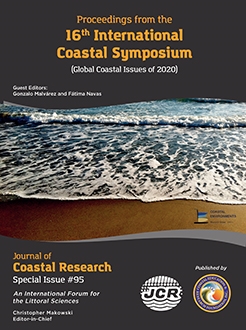Sousa-Felix, R.C.; Pessoa, R.M.C.; Costa, R.M.; Jiménez, J.A., and Pereira, L.C.C., 2020. Recreational beaches management: A case study from the Amazon coast. In: Malvárez, G. and Navas, F. (eds.), Global Coastal Issues of 2020. Journal of Coastal Research, Special Issue No. 95, pp. 775–779, ISSN 0749-0208.
Coastal tourism is the most important segment of this economic sector, given that a majority of tourists tend to prefer coastal destinations. The sandy beaches of the Brazilian Amazon coast, with their well-preserved environments distributed along 3900 km of coastline, have considerable potential for tourism, in particular, ecotourism. The aim of this study was to evaluate of the tourism scenario of three Amazon beaches for the identification of the strengths and weaknesses of this environment, and the investigation of the principal external factors (legislation, economics, and environmental conditioners) that influence local tourism. Data on hydrological and socioeconomic variables were collected and used as input for a SWOT matrix to determine the principal strengths, weaknesses, opportunities, and threats existing for these beaches. The principal opportunities are derived from the legislation, including the State Coastal Management Plan, the Beachfront Project, and the management plans of the local conservation units. The threats are maximized by the inadequate application of the legal management mechanisms, which has resulted in beaches with no public sanitation, water treatment, the unregulated occupation of land, low levels of education, environmental degradation, and a loss of biodiversity. The principal strength for the management of the Amazonian beaches is the fact that these sites are in the public domain, which allows the government to implement wide-ranging management strategies based on the systematic evaluation of parameters. The weaknesses of the beaches identified in the present study included the lack of public sanitation, high concentrations of visitors, and inadequate beach security services. Overall, the analysis of the SWOT matrix indicated that the adoption of the Integrated Coastal Zone Management (ICZM) principles would provide an excellent opportunity for the changes necessary to resolve the environmental problems observed on the study beaches. This would help to establish a more inclusive, participative, and proactive approach to the management of the local beach environments.





